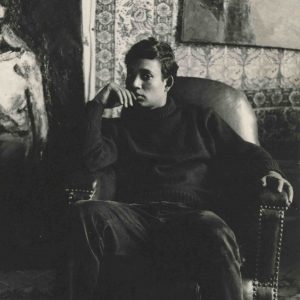About The Symposium:
Online study day Albert Adams: In Context brings together internationally renowned curators, art historians and academics to delve into the life, works, contexts and themes of London-based South African expressionist artist Albert Adams (1929-2006).
Convened and presented by independent art historian Dr Alice Correia in collaboration with the University of Salford Art Collection, the day will touch on a range of topics from self-portraiture, post-war painting and printmaking, to Black modernism, masculinity and sexuality, and the South African artistic community in London.
Plus, we will be releasing new poetry written in response to Adam’s work by Professor Jackie Kay CBE, former Chancellor and writer-in-residence at the University of Salford.
Overlooked by the art world in his lifetime, the artists’ work draws on history, politics, and personal experience. Of African and Indian heritage, Adams was denied access to formal arts education in South Africa due to apartheid policy; he moved to London in 1953 to undertake a scholarship at the Slade School of Art and eventually settled to live, work and teach in the city. Much of his work focused on political oppression and abuse of power – from the imprisonment of activist friends and relatives during apartheid to more recent conflicts and human rights violations in Darfur and Abu Ghraib. Through an ongoing series of self-portraits, Adams also continually explored his own sense of identity.
The University of Salford Art Collection holds one of the largest archives of Adam’s work – including painting, printmaking and studio ephemera – presented by Adam’s partner Edward Glennon through the Art Fund in 2012. A selection of works are on permanent display in the Albert Adams room on campus (viewable by appointment) with a new display recently curated by Dr Alice Correia.
Coinciding with the study day, the University of Salford Collection will also be launching a new online catalogue of digitized works and associated resources and materials – starting with a focus on the Adams collection.
The study day, which will include presentations, discussions, and time to explore images and resources online, is free to book and open to all.
Albert Adams (1929-2006)
Albert Adams was born in Johannesburg, in 1929. Despite excelling at school, Adams was denied entry to the Michaelis School of Fine Art, University of Cape Town, on the grounds of his race. Undeterred, he moved to London in 1953 to undertake a scholarship at the Slade School of Art. Following the Slade, he was awarded a scholarship to attend Munich Academy of Arts, 1956-1957, and went on to study with Oskar Kokoschka at his School of Vision in Salzburg. After his studies Adams returned to South Africa, where he painted the triptych, South Africa 1959, which is considered by many to be amongst the most important paintings in the history of twentieth century South African art. However, after the Sharpeville Massacre in 1960 Adams, like many other black South Africans, decided to leave the country. He returned to London, where he continued working and teaching. His work was included in the 1961 Sao Paulo Biennale, and he had solo exhibitions at the Africa Centre, London, in 1974 and 1980. He was lecturer in Art History at the City University from 1979 until 1990. Albert Adams died in London in 2006.
Although the recipient of several retrospective exhibitions in South Africa, most notably, Albert Adams: Journey on a Tightrope, Iziko South African National Gallery, Cape Town, 2008, and Albert Adams: The Bonds of Memory at Smac Gallery, Cape Town, 2016, Adams is little known in the UK. As Dr. Christine Eyene succinctly put it, Adams was, “under-appreciated by the British art establishment”.
The University of Salford Art Collection holds a substantial collection of prints and paintings by Adams, in addition to objects from his studio, and archival papers, acquired with the support of The Art Fund, and made possible by the generosity of Edward Glennon. The Albert Adams Room in The Old Fire Station was named in honour of the artist in February 2015.
